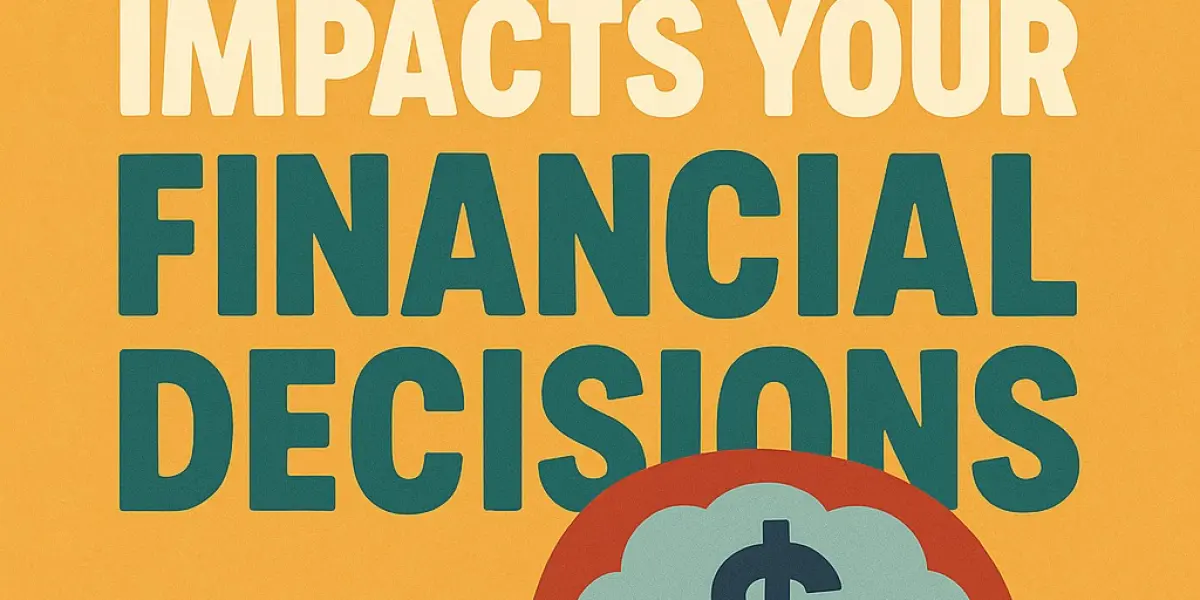
- Raj Ashar
- 29-Jul-2025
- Finance
The Most Powerful Financial Tool Is Your Mindset - Not Your Bank Balance
The Most Powerful Financial Tool Is Your Mindset - Not Your
Bank Balance
When most people
think about building wealth, they think about growing their cash balance,
investing in real estate, or finding a high-paying job. People rarely realize
that the true foundation for financial success isn't money, it's the mindset.
Your mindset and money are more closely
intertwined than any balance sheet or portfolio can ever reveal.
Your mindset about money determines how
you earn, spend, save, and invest. The mental frameworks you have internalized
about wealth and success inform every financial decision you make, often
without conscious thought. If your mental framework consists of fear, or
comparative thinking, then no amount of income will ever feel enough.
Contrarily a strategic, and
growth-oriented financial mindset allows for consistent upward movement in
every aspect of your life, regardless of where you start.
Rethinking Financial Freedom:
It Begins With Belief
Real financial freedom is more than
simply being able to buy whatever you want. Real financial freedom is knowing
your future is secure, your present is planned, and your income exists to
support your life goals, not the other way around.
Financial freedom includes being able to:
●
Make choices without money being
the first obstacle
●
Save and invest with intention,
not anxiety
●
Say “yes” to dreams like travel,
homeownership, and early retirement
●
Say “no” to toxic work cultures
because you’re not dependent on the next paycheck
However, none of this starts with a
financial product. It starts with a change in mindset - from reactive to
proactive, from all over the place to having a strategic plan.
Scarcity Mindset vs.
Abundance Mindset
A lot of our financial behaviours are
informed by stories we have taken from our formative years and surrounding
social situations. These stories include two conflicting beliefs: scarcity and
abundance.
Scarcity Mindset
People who operate from a scarcity
mindset see money as a limited, and continually depleting resource. They tend
to think:
●
“There’s never enough.”
●
“I can’t afford it.”
●
“I’ll always be behind others.”
Such thinking can lead to cash hoarding,
fear-based choices, and missed opportunities. When income increases, the fear
does not go away, it only grows with the person’s lifestyle. Scarcity thinking
traps people in what they don’t have, rather than what they can build.
Abundance Mindset
The abundance mindset is grounded in a
belief that opportunities are everywhere and money is simply a tool that will
respond to intention and strategy. They ask;
●
“How can I make this work?”
●
“What skill do I need to earn
more?”
●
“What investment will compound my
future?”
The abundance mindset does not mean
ignoring obstacles but programs the brain to look for opportunities and not
obstacles. It fosters curiosity, skills development, and risk-taking in a
calculated manner. It is necessary to build sustainable wealth building
strategies.
Emotional Spending: The
Silent Budget Killer
Of all the significant threats to your
long-term financial success, the largest threat isn't taxes or inflation--it's
emotional spending. Money moves made by people are based on emotional drivers
like anxiety and excitement. They shop online to relieve stress, they pull
money out of investments in a temporary downturn, and then they overspend when
they receive a bonus for "working hard."
When your emotions take the lead in your
wallet, logic is disregarded. This is how even the best-intentioned thinkers
fall into cycles of debt or miss out on investment gains.
Financial discipline isn't about
prevention. It's about managing your impulses so that your financial decisions
move you toward your long-term goals and away from a temporary emotional state.
A healthy financial mindset sees this. It
creates space for you. It helps you ask:
"Is this decision solving a true
need, or is it addressing a temporary feeling?"
That single moment of space can save you
years of financial devastation.
The Psychology of Money:
Beliefs Run Deeper Than Budgets
Budgeting software and tracker apps are
great, but they are really only scraping the surface. The deeper question is,
what do you actually believe about money? If you think wealth is only for the
lucky or for those with connections, you will not pursue powerful financial
actions. If you think talking about money is shameful, you'll avoid money
conversations that could transform your financial future altogether.
If you want to change your results, you
must dive in and examine your internal money script. Common limiting beliefs
include:
●
"Getting money is hard."
●
"I'm not good with
money."
●
"I'll save when I make
more."
●
"Investing is risky for
someone like me."
These limiting beliefs become
self-fulfilling prophecies. You don't invest because you fear losing. You
overspend because you think money will never be enough. You avoid learning,
because you think you won't get it anyway. Shifting those beliefs allows you to
create disciplined saving habits and proper money decisions.
Strategic Thinking Over
Income Brackets
Having high income doesn’t equal high
wealth. Many individuals making seven figures are living paycheck to paycheck,
facing rising debt levels or ongoing financial stress. Conversely, lots of
people making a small amount of money retire happy and comfortable. The
difference is obviously money management and planning ahead.
A strong mindset gets you:
●
Automate savings
●
Build in buffers for emergencies
●
Learn before investing
●
Ask questions, read books, listen
to experts
●
Postpone gratification without
feeling deprivation
It is not about how much you make. It is
about what you do with what you make. This is where mindset wins over math.
Financial Planning Is a Daily
Mindset Practice
Wealth building is a process, not a
one-time choice. It consists of tiny repeated actions every day. It's saying no
to impulse purchases and yes to your goals. It's looking at your monthly
budgeting progress. It's knowing you'll have setbacks.
This is what true financial planning
habits look like rooted in mindset:
●
You invest early, small amounts or
large amounts.
●
You make spending decisions based
on value.
●
You constantly upskill to raise
all of your earning potential.
●
You avoid comparison and focus on
your own growth.
●
You see debt as something to
understand and solve wisely, rather than shameful.
Mindset doesn’t mean always staying
positive; It means being intentional and proactive about your financial life.”
Building a Growth-Oriented
Financial Mindset
If you’re ready to take control of your
finances through mindset, start here:
- Audit your beliefs.
Write down the first five thoughts that come to mind when you hear “money.” Are they empowering or limiting? - Set clarity-based goals.
“Save more” is vague. “Save ₹1,00,000 in one year for a home deposit” is actionable. - Educate yourself regularly.
You don’t need a finance degree. Start with simple podcasts, books, or YouTube channels. Growth requires awareness. - Ask better internal questions.
Shift from “Can I afford this?” to “What do I need to change to afford this?” - Reflect on your
emotional triggers.
Every time you feel the urge to spend impulsively, stop and ask what you’re truly trying to satisfy.
These steps slowly rewire your brain and
develop a new financial identity. That identity is what sustains your external
success.
Conclusion: Wealth Is a Mind
Game Before It’s a Money Game
No money management tool will ever trump
the power of YOUR thinking... your beliefs, your habits, your decisions... They
are the real foundation for everything else.
Your mindset is the control tower.
Money is just the aircraft.
Before you pursue the next investment
opportunity, stop and ask yourself; is my mindset prepared for wealth? If you
don't manage your mind first, money will always manage you.
You don't need a finance degree to make
it.
You need belief, direction and discipline.
And that's not based on a bank transaction,
it's a quiet decision made in your brain.
